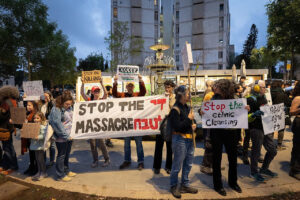The Israeli army is facing its biggest refusal crisis in decades

Activists from Free Jerusalem protest against the war in Gaza, Jerusalem, 9 April 2025
Meron Rapoport writes in +972 on 11 April 2025:
No one can state precise numbers. No political party or leader calls for it explicitly. But anyone who has spent time at anti-government protests or on Hebrew-language social media in recent weeks knows it to be true: it is becoming increasingly legitimate to refuse to report for military service in Israel — and not only among the radical left.
In the lead-up to the war, talk of refusal — or more precisely, “ceasing to volunteer” for the reserves — had become a significant feature of the mass protests against the Israeli government’s judicial overhaul. At the height of those protests, in July 2023, over 1,000 pilots and Air Force personnel declared that they would stop showing up for duty unless the legislation was halted, leading to warnings from senior military officials and the head of the Shin Bet that the judicial overhaul endangered national security.
The Israeli right continues to argue to this day that those refusal threats not only encouraged Hamas to attack Israel but also weakened the army. But in truth, all the threats disappeared into the ether on October 7, with the protesters overwhelmingly and enthusiastically volunteering to enlist.
For 18 months, the vast majority of Israel’s Jewish population has rallied around the flag in support of the onslaught on Gaza. But particularly after the government decided to collapse the ceasefire last month, cracks have started to appear.
In recent weeks, the media has reported a significant decline in soldiers showing up to reserve duty. Although the exact numbers are a closely guarded secret, the army informed Defense Minister Israel Katz in mid-March that the attendance rate stood at 80 percent, compared to around 120 percent immediately after October 7. According to Kan, Israel’s national broadcaster, that number was a fudge: the true rate is closer to 60 percent. Other reports speak of attendance rates of 50 percent or lower, with some reserve units resorting to trying to recruit soldiers via social media.
“Refusal comes in waves, and this is the biggest wave since the First Lebanon War in 1982,” Ishai Menuchin, one of the leaders of the refuser movement Yesh Gvul (“There is a Limit”) which was founded during that war, told +972.
